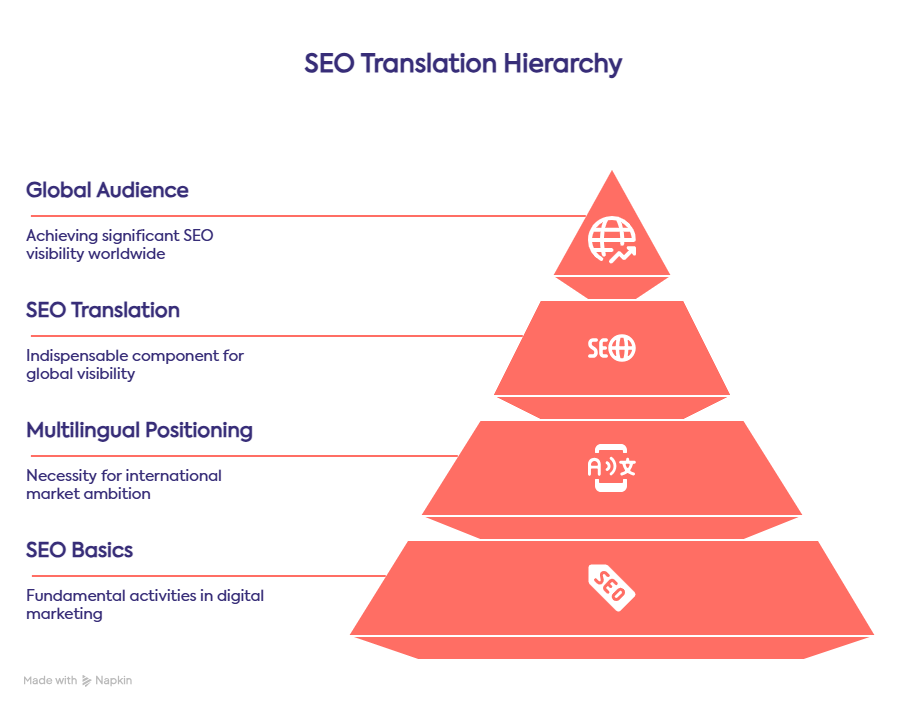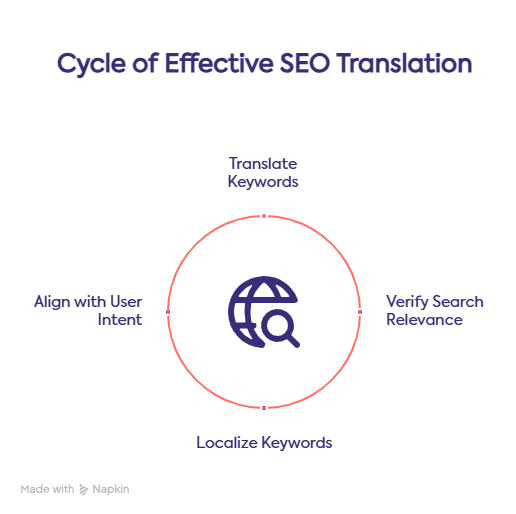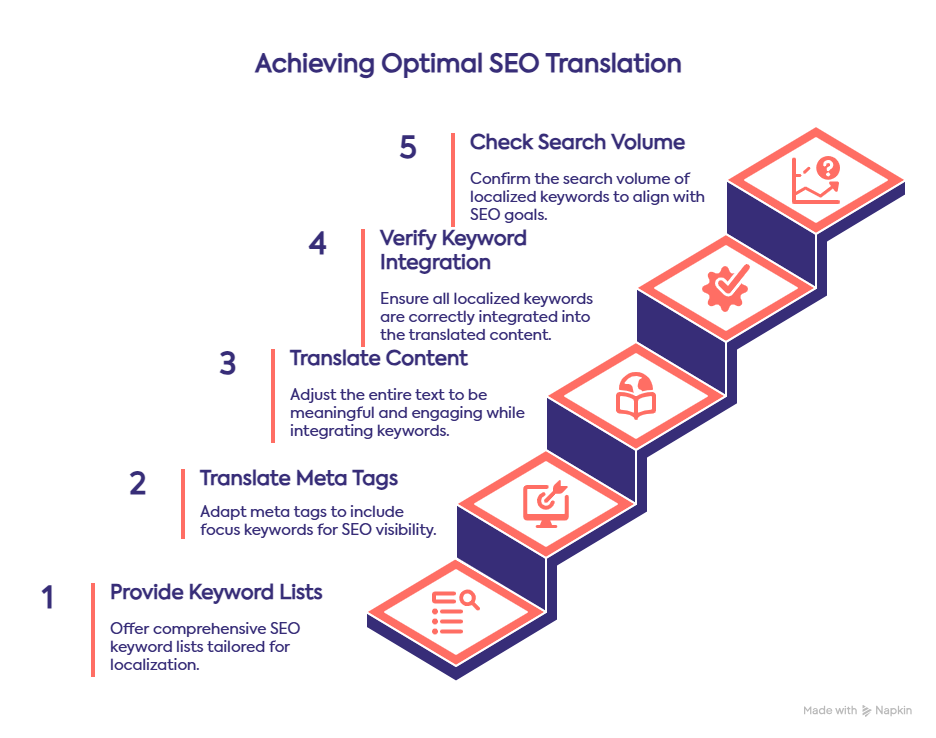What is SEO translation and why do you need it?

Website positioning is one of the basic activities in today’s internet marketing. Its purpose is to improve the visibility of a website in Google search results, which makes it possible to generate valuable user traffic and attract new customers. Search Engine Optimization (SEO) is one of the fundamental activities in today’s digital marketing. Its core purpose is to improve the search engine visibility of a website in Google search results, which in turn drives valuable user traffic and attracts new customers.
When your ambition extends beyond local borders to international markets, thinking about multilingual positioning is not just an option – it’s a necessity. This is precisely where SEO translation becomes an indispensable component. So, what exactly is it, and what are the crucial aspects to consider when commissioning such specialized translation services? Understanding this is the first step towards achieving significant SEO visibility for your global audience.
SEO translations? Yes, we do!
What is SEO translation? Understanding the core concept
Let’s begin with a clear definition. Most people are familiar with what classic translation services entail: the accurate conversion of a message (whether a single word or an entire text) from a source language to a target language. This primarily facilitates multilingual communication, allowing individuals who don’t share a common tongue to understand each other.
So, how does SEO translation differ? Building on the above, SEO translation can be defined as a highly specialized activity ensuring that international versions of popular search engines like Google can accurately interpret and understand your multilingual website. Your search engine rankings are heavily influenced by how search engine algorithms perceive and evaluate your website content. Therefore, SEO translation isn’t merely about converting text; it’s a strategic process that covers the translation and thoughtful adaptation of your multilingual content, alongside other critical website structure components and elements crucial for the Google algorithm. This deep dive into content adaptation and content optimization is vital for securing superior SEO performance and search engine visibility.

Key elements impacting your site’s position in Google: A focus on translatable aspects
Numerous factors contribute to your website’s search engine rankings in Google. For the scope of this discussion, we will primarily focus on those directly influenced by SEO translation and SEO localisation efforts. Keywords that strategically saturate your multilingual content are absolutely essential, whether it’s a detailed blog entry or a comprehensive company offer page. These keywords must also be precisely incorporated into your meta description and meta tags (such as the meta header). These are the first textual elements a user will typically see in the search results after entering their query. While various aspects of technical SEO and overall seo optimisation are critical for digital presence, from the perspective of SEO translation, mastering these content and metadata elements is paramount when engaging translation services. This strategic approach ensures robust SEO performance and helps your translated content rank effectively.
The art of translating keywords: Beyond literal interpretation
Given the profound impact of the aforementioned elements on your search results position, a crucial takeaway emerges: effective SEO translation must inherently begin with the meticulous process of translating keywords. However, it’s a common misconception that simply a literal translation of these words suffices. On the contrary, the first and most critical step is to verify whether the literally translated keywords are genuinely being searched for by users in the target market. This necessity underscores the importance of keyword localization, which involves thoroughly adapting keywords to the specific cultural nuances and linguistic patterns prevalent in the target country. This comprehensive process forms the bedrock of a truly key SEO translation strategy, ensuring your multilingual keyword strategy aligns with actual user intent.

Understanding Keyword Localization: A practical deep dive
Let’s illustrate keyword localization with a concrete example to fully grasp its significance. Imagine you operate a car repair shop specializing in wheel rim regeneration. For your Polish website, the most effective phrases for multilingual search marketing and positioning might be (translated from Polish to English for this example):
- regeneration of rims,
- regeneration of aluminium rims,
- regeneration of steel rims.
Using a free SEO tool like Ubersuggest, these Polish keywords show a respectable average of 3870 monthly searches in Google Poland, indicating a good search volume. Now, consider expanding to Germany and aiming to position your multilingual website for similar services. A literal translation would yield:
- randsaumregeneration,
- regenerierung von Aluminiumfelgen,
- regenerierung von Stahlfelgen.
If we input these literally translated keywords into Ubersuggest, you’d find that ‘randsaumregeneration’ registers no searches from German users whatsoever. The other two phrases also exhibit zero search volume. Does this imply Germans don’t repair their rims? Absolutely not. It highlights the critical need to identify the appropriate phrases that actual German users type into Google, understanding their unique local search behavior and cultural adaptation. This is precisely where SEO localization becomes indispensable for international SEO content.
Crafting a robust Keyword Localization strategy
Keyword localization is achievable only when you leverage the right translation tools and possess a profound understanding of the target language, ideally as a native speaker using it in daily communication. Reverting to our example: German users seeking rim repair services are far more likely to input phrases like:
- alufelgen reparatur,
- felgen reparatur,
- felgen doktor.
According to Ubersuggest, these phrases collectively average 19,100 monthly searches in Google Germany, demonstrating a significantly healthier search volume. This stark contrast vividly illustrates the paramount importance of keyword localization within SEO translation. The reliance on incorrectly translated phrases guarantees that your multilingual content will remain largely invisible to foreign users. This, in turn, translates into missed opportunities for your offerings to be discovered, directly impacting sales from the organic search channel and severely compromising your SEO performance. This scenario powerfully underscores the necessity of targeted SEO translation and a well-defined multilingual SEO strategy.
How to order SEO translation services for optimal results
As a client, comprehending how to effectively implement SEO translation and keyword localization is crucial. When you’re looking to commission SEO translation services, it is essential to provide your professional SEO translator with precise guidelines and clearly articulate your objectives. This is the only way to define detailed translation requirements that will genuinely contribute to the desired outcome. So, how should you approach ordering SEO translation to ensure it aligns with your content strategy and broader digital marketing goals?
Provide comprehensive SEO keyword lists for keyword localisation
Firstly, your chosen experienced SEO translator must receive comprehensive SEO keyword lists specifically tailored for keyword localisation. This forms the absolute foundation of any successful SEO translation project, whether you’re outsourcing a single article, an entire multilingual website, or just a specific subpage. The nature of the keywords that need to be organically embedded within the text will fundamentally dictate the approach to translation. It’s not uncommon for a professional SEO translator to need to significantly edit or even rewrite entire paragraphs to effectively transfer the meaning from the source text while ensuring content adaptation and content transcreation for international SEO content.
Emphasize the importance of translating meta tags
The subsequent vital step involves preparing and submitting your meta tags for SEO translation. These are the critical elements that appear first in search results and play a significant role in SEO visibility. This content, including your meta description and seo titles, also requires meticulous adaptation to the chosen keywords. This might even necessitate a complete overhaul of the original meta tags. Consequently, your order for translation services should contain unequivocal guidelines identifying the focus keyword for each piece of content, along with any auxiliary words. Don’t forget about URL slugs and their SEO optimisation too.
Holistic SEO translation of your website, article, or subpage
Once the initial two steps are meticulously completed, you can provide the entire body of content for SEO translation. With the previously established guidelines at hand, an experienced SEO translator will carefully adjust the wording of the entire text. The aim is to ensure it remains both highly meaningful and engaging for the user, while simultaneously being exceptionally valuable for your company or the SEO specialists responsible for your website’s positioning. After receiving the finished translated content, it is imperative to verify that the translator has indeed integrated all the previously localized keywords. This due diligence is crucial for helping your translated content rank optimally and achieve desired search engine visibility.
Nevertheless, it’s vital to remember that due to varying potentials of specific phrases, as well as distinct cultural differences between your home country and the country of destination, these local keywords may vary quite essentially. For this reason, always request that your professional SEO translator additionally determine the search volume for each suggested phrase. This proactive step provides crucial data, allowing you to ascertain if the proposed alternative words truly reflect the search volume potential you originally anticipated. This strategic insight is invaluable for any multilingual SEO strategy.

Key considerations when commissioning SEO translation
The most critical understanding is that SEO translation demands a fundamentally different approach compared to standard written marketing translation. Firstly, this divergence stems from the stringent requirements that the given multilingual content must satisfy for the Google algorithm to deem it valuable, irrespective of whether the issue pertains to an entire multilingual website, a single article, or a specific subpage. The appropriate keyword localisation remains the paramount link in successfully positioning a website within foreign multilingual search engines. A mere literal translation of your existing seo keyword lists will almost certainly fall short of delivering the desired search engine rankings, as it’s highly probable that foreign users search for entirely different terms in Google.
Hence, it is absolutely essential to ensure that your SEO translation is executed by a professional SEO translator or a reputable translation agency with a proven track record. This specialist must possess the expertise to effectively utilize translation tools and perform robust competitive analysis and keyword research to accurately assess the potential of different multilingual keyword variations. Without this specialized skill set, the translator will lack the necessary insights to optimize your order effectively and achieve the SEO performance and conversion optimization you desire. This adherence to SEO best practices is what truly makes the difference between ordinary translation and exceptional SEO translation.
Other articles:
The dropshipping model – how to start selling in several countries simultaneously
5 More Tips on Making Your Website Multilingual
3 of the Best E-commerce Platforms Today
SEO translations? Yes, we do!
Marketing translation as the key to success of the fashion industry. Cooperation with a popular fashion brand
We cooperated with many customers on a daily basis. They include local companies, international enterprises and well-known brands. What are the similarities between all of them? Everyone expects high-quality translations that will help in business development. Additionally, professional translations affect their image, contribute to the opinions of recipients and are the decisive factor when it […]
Hemingway Editor and other tools for text proofing and translation
Typically, content writers first note down the message they wish to put across to their audience. Then, they re-read and edit the text. This way, they can achieve better readability, understanding and structure, and at the same time they can correct any errors in the content. It is a complex process, but fortunately there are […]
Translation of advertising slogans – how not to fall into the language trap?
Advertising translation involves the process of transferring advertising messages from one market to another. The advertising discourse is created in a language that is not only a communication tool, but also an expression of culture. This makes ad translation a highly accuracy-demanding activity. Translating slogans requires both a cultural and linguistic connection. Adapting a brand […]
Top 8 Languages for E-commerce purposes: Boosting Global Reach Through Effective Translation
Do you manage an e-shop and want to source customers abroad to increase profit? Translation will be the basis for reaching foreign recipients with your offer. You need to start speaking their local language and adjust product descriptions or service descriptions to the country where you intend to sell them. This process of adapting your […]



